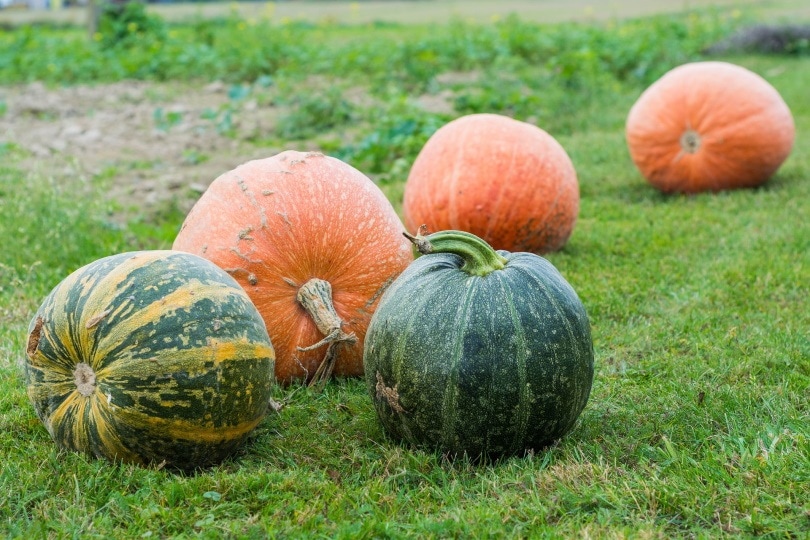
Pumpkin is a fall staple that’s prominent in our lives from October through December. Halloween gives us bright Jack-o-lanterns, and Thanksgiving and Christmas are the perfect times to enjoy a pumpkin-spiced latte. But is pumpkin good for dogs?
Pumpkin is a superfood, and while your dog definitely shouldn’t be lapping down a pumpkin chai latte, fresh or canned pumpkin has many health benefits for our canine friends. This article will look at ten health benefits pumpkin can provide dogs.
The 10 Greatest Health Benefits of Pumpkin for Dogs
1. Pumpkin Is an Excellent Source of Vitamins
The mature winter squash we all know has a vast range of healthful vitamins and minerals available to your dog. Vitamins such as vitamins A, B1, B6, and C, copper, calcium, and magnesium are found in high concentrations in pumpkin, which all help the body perform essential functions.
For example, 8.6 ounces of cooked pumpkin (about one cup) contains:
Because pumpkin is cheap and easy to source, it’s a great way to add a vitamin boost to your dog’s meals. It’s also tasty, so it should go down very well!

2. It Can Help With Digestion
Pumpkin is packed full of highly soluble fiber. This means it helps absorb any excess moisture in the intestines to bind feces and move things along in the digestive tract. Not only does pumpkin bulk the stool, but when your dog digests this fiber, it will actually ferment it in their stomachs.
In addition, fatty acids produced by this process will provide essential energy for your dog’s cells, and pumpkin also lowers the level of acidity in your dog’s intestines. All these factors together promote healthy and comfortable digestion!
3. It’s Good for Their Eyes
Pumpkins’ orange color benefits a dog’s eyes. Beta-carotene, the substance responsible for giving orange vegetables their color, is the precursor to vitamin A. Vitamin A keeps the eye’s cornea clear and helps form rhodopsin. For a dog to see in low-light conditions, rhodopsin is needed, so pumpkin can genuinely help them see in the dark.

4. It Can Help Treat Diarrhea
Because of the pumpkin’s high fiber content, it can effectively reduce diarrhea. The fiber in pumpkin is soluble1, meaning that it dissolves in water and forms a gel. This fiber will draw excess moisture into itself from your dog’s stool, firming it up and slowing its transit along the digestive system. This, in turn, can calm diarrhea and help your dog get back to normal.
5. It Contains Prebiotics
Prebiotics are non-digestible fibers found in many foods, such as pumpkins. Prebiotics help feed the healthy bacteria that naturally live in the gut, including those in your dog’s stomach. These bacteria affect many body systems and processes, including the immune system and metabolism.
Pumpkin provides these probiotics, which can also improve digestion and help to relieve constipation and diarrhea. Canned pumpkin contains more fiber and probiotics than fresh pumpkin, so plain canned pumpkin is better for your dog than fresh.
6. It’s Full of Antioxidants
Pumpkin contains many antioxidants, including beta-carotene, beta-cryptoxanthin, and alpha-carotene (plant pigments). Antioxidants fight oxidative damage caused by free radicals, which the body produces as a part of the metabolic and aging process.
This has many benefits for a dog, as fighting free radicals with antioxidants can halt the oxidative process, which has been linked to cancer and heart disease in humans. Free radicals can also cause cell damage, and fighting them with natural antioxidants such as pumpkin can boost your dog’s health and keep them fit for longer.

7. It Can Boost Immune Health and Function
The immune system needs some essential vitamins and minerals to function correctly. Folate, vitamins E and C, and iron are all found in pumpkin, giving the immune system an incredible boost. Pumpkin is an excellent source of immune-boosting components for dogs; even beta-carotene is converted to vitamin A in the body.
8. It Can Improve Coat and Skin Health
Pumpkin is not just a great source of vitamins A and E but is also high in niacin, omega fatty acids, and zinc. Omega 3 and omega 6 are particularly beneficial to the dog’s skin and coat health, as they moisturize both, help to prevent dandruff, and promote a healthy skin barrier.
Pumpkin flesh has a good amount of omega 3, but the seeds pack a punch when it comes to the skin and coat-boosting oils. Don’t give your dog whole pumpkin seeds because they can become a choking hazard in smaller dogs. Instead, baking the seeds and grinding them into a powder is an excellent way of incorporating them into your dog’s diet. This can even be sprinkled over canned pumpkin for an extra boost!

9. It Can Help Dogs Get Enough Moisture
Pumpkin has an incredibly high moisture content, with fresh pumpkin being the most hydrating. Fresh pumpkin is 94% water, and a refreshing treat can help your dog stay hydrated (particularly in warmer weather). Canned pumpkin contains less water since it’s extracted during the canning process. Always have fresh water available for your dog; they won’t be able to stay completely hydrated from food.
10. It Can Make Them Happy!
Pumpkin is a healthy treat that most dogs absolutely love, and it’s low in calories as well as delicious. If your vet thinks your dog needs to lose weight, pumpkin is a good treat replacement and filling due to all of the fiber. It can be a brilliant way to provide vitamins and boost your pup’s health, all while making their tail wag.
How Much Pumpkin Should I Give My Dog?
The amount of pumpkin to give your dog depends on their size. Smaller dogs can have a few teaspoonfuls as a serving, and extra-large dogs can have as much as a quarter cup. The following are the recommended serving sizes of pumpkin for dogs:

Can Pumpkin Be Harmful for Dogs?
Too much of a good thing is never great; the same goes for pumpkin. While pumpkin is a superfood for dogs (and people), giving your dog too much may cause some side effects.
Dogs can end up with diarrhea if they eat too much, which isn’t good if you’re trying pumpkin to treat an upset stomach. There is a lot of fiber in pumpkin, which can cause nutrient and protein deficiencies. High amounts of fiber can stop the absorption of nutrients and protein from other foods, so keep the amount of pumpkin your dog eats to the recommended amount to prevent any side effects from occurring.
Is Canned Pumpkin Safe?
Be sure to read the ingredients list of any canned pumpkin you give your dog since some brands contain toxic ingredients. Sweet pumpkin pie filling may contain xylitol, which is highly dangerous to dogs, and even small amounts can cause liver damage, seizures, and death in a very short period. Plain canned pumpkin is the only kind you should give your pup, which is just the flesh of a regular pumpkin.
Conclusion
Pumpkin has more health benefits for dogs than you might have thought. This humble fruit is culturally iconic, but its uses extend well beyond our beloved pumpkin pie. Plain canned pumpkin is the best treat for your pup since it contains probiotics, fiber, and many vitamins and minerals. It will give them a boost and help keep them stay healthy, but avoid brands with extra sugar and chemical additives.
Featured Image Credit: Michelle D. Milliman, Shutterstock








